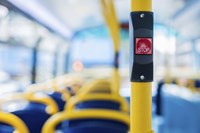
- New report quantifies for the first time the impact of bus services on reducing social deprivation
- A 10% improvement in bus services would lead to almost 10,000 more people in work in the poorest neighbourhoods in England
The Value of the Bus to SocietyImproving local bus services boosts employment and improves income, helping to reduce social deprivation, according to a new report published today by Greener Journeys, the sustainable transport group.
The research, conducted by KPMG and the Institute for Transport Studies at the University of Leeds, is ground breaking in that it investigates and quantifies for the first time the impact of bus services on tackling social deprivation.
It finds that a 10% improvement in local bus services is linked to a 3.6% reduction in social deprivation across England, taking into account employment, income, life expectancy and skills.
Importantly, it concludes that a 10% improvement in local bus services in the 10% most deprived neighbourhoods across England would result in:
- 9,909 more jobs, the result of a 2.7% fall in employment deprivation
- 22,647 people with increased income, the result of a 2.8% drop in income deprivation
- 2,596 fewer years of life lost
- 7,313 more people with adult skills
- 0.7% increase in post-16 education
The report, The Value of the Bus to Society, demonstrates the important role that buses have in helping to reduce social deprivation in the UK, where 1 in 4 people is at risk of social exclusion, and 1 in 4 people do not have access to a car.
It builds on existing research by Greener Journeys which shows that buses bring huge economic benefits to the UK. Some 3.5 million people in the UK travel to work by bus, and these commuters generate more than £64 billion worth of goods and services per year. Furthermore, proper investment in local bus infrastructure delivers vast rewards, with every £1 spent on local bus priority measures delivering up to £7 in economic benefit.
Among its recommendations, Greener Journeys is calling on Government to prioritise investment in buses and local bus infrastructure. It is also asking decision makers to consider the wider social benefits of projects when appraising transport schemes and investment cases.
Analysis by KPMG found that wider social impacts of buses add over 30% to the benefit-cost ratio of bus investments.
Claire Haigh, Chief Executive of Greener Journeys, said:
“This vital new research demonstrates that bus travel doesn’t just benefit the economy, it can also help alleviate deprivation and improve people’s life chances.
“This new evidence shows that bus investment is not just a transport policy – it is a health policy, an education policy, a skills policy, a wellbeing policy, and a social cohesion policy. We urge Government to consider these findings when contemplating future investment in bus services. Bus investment can deliver truly inclusive and sustainable economic growth.”
Katie Schmuecker, Head of Policy, Joseph Rowntree Foundation, said:
“If the Government is to meet its promise of making the UK a country that works for everyone, we must solve the problem of poverty in this country. As this report shows, buses play a central part in fighting poverty, keeping those on lower incomes or the unemployed, connected to economic opportunities.
“A good bus service can make the difference to whether someone can sustain a job, access vital public services or shop around for low cost goods and services.”
Gerard Whelan, Director at KPMG said:
“We were delighted to work with Greener Journeys on this crucial research, and the evidence clearly shows the social value of local bus connectivity.
“We hope that by proving the impact of buses on health, education and deprivation, we can demonstrate to policymakers the vital importance of investing in transport infrastructure.”
About Greener Journeys.png)
Greener Journeys is a campaign dedicated to encouraging people to make more sustainable travel choices. It is a coalition of the UK’s leading public transport organizations, user groups and supporters. It aims to reduce CO2 emissions from transport by encouraging people to switch some of their car journeys to bus or coach instead. Switching from car to bus for just one journey a month would mean one billion fewer car journeys on our roads and would save 2 million tonnes of CO2 every year.




Comments
There are no comments yet for this item
Join the discussion